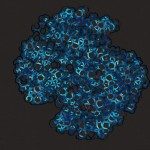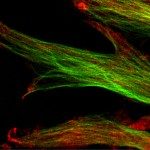Lien vers Pubmed [PMID] – 18662407
BMC Microbiol. 2008 Jul;8:128
BACKGROUND: All aerobically grown living cells are exposed to oxidative damage by reactive oxygen species (ROS). A major damage by ROS to proteins is caused by covalent modifications of methionine residues giving methionine sulfoxide (Met-SO). Methionine sulfoxide reductases are enzymes able to regenerate methionine and restore protein function after oxidative damage.
RESULTS: We characterized the methionine sulfoxide reductase genes msrA and msrB in Bacillus subtilis, forming an operon transcribed from a single sigma A-dependent promoter. The msrAB operon was specifically induced by oxidative stress caused by paraquat (PQ) but not by H2O2. Spx, a global oxidative stress regulator in B. subtilis, is primarily responsible for this PQ-specific induction of msrAB expression. In support of this finding, an spx deletion mutant is extremely sensitive to PQ, and increased expression of msrA was identified in a clpX mutant in which Spx accumulated. However, the Spx effect was also visible under conditions where the protein did not accumulate (PQ treatment), suggesting a specific molecular effect at the level of the Spx protein. Indeed, the CXXC motif of Spx was found essential for its function in the PQ-specific induction of msrAB expression. PQ caused a modification of Spx requiring at least one of the cysteines of the CXXC motif of Spx. The PQ modified form of Spx showed a dynamic change in vivo.
CONCLUSION: The Spx mediated PQ-specific regulation pathway of the msrAB operon in B. subtilis is reported. Our results suggest that PQ induced the expression of msrAB partially through an oxidation on Spx via modification of its CXXC motif.





